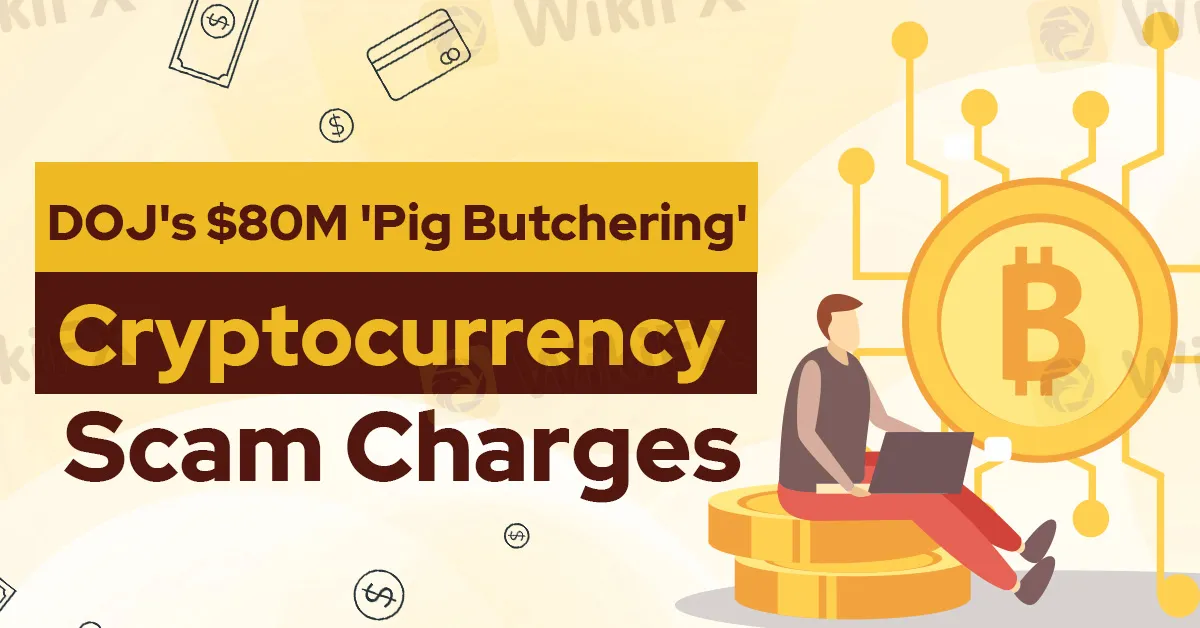简体中文
繁體中文
English
Pусский
日本語
ภาษาไทย
Tiếng Việt
Bahasa Indonesia
Español
हिन्दी
Filippiiniläinen
Français
Deutsch
Português
Türkçe
한국어
العربية
DOJ's $80M 'Pig Butchering' Cryptocurrency Scam Charges
Abstract:Amidst the $80 million 'Pig Butchering' scam charges by the DOJ, this article delves into the scheme's intricate workings, the accused, and the urgent need for heightened security in FX platforms.

Pig Butchering schemes, notorious for exploiting trading platforms such as MetaTrader, faced a brief suspension from the App Store, prompting MetaQuotes to tighten regulations for white label providers to thwart FX and Crypto scams through MT4/5.
The U.S. Department of Justice has pressed charges against four individuals linked to an intricate cryptocurrency investment scam known as “pig butchering.”
Originating from Southeast Asia, the scam amalgamates aspects of investment ploys, romance deceits, and cryptocurrency swindles, earning its name from the Chinese phrase “Shāz Hū Pán” (杀猪盘), symbolizing the process of gaining trust before exploiting it for financial gain.

Lu Zhang, Justin Walker, Joseph Wong, and Hailong Zhu are accused of orchestrating shell companies and bank accounts to launder the scam‘s proceeds, involving 284 transactions and resulting in over $80 million in victim losses, with more than $20 million directed into defendants’ accounts.
The heart of the “pig butchering” fraud involves swindlers reaching out to potential victims through dating services, social media, or direct messages, building relationships, and introducing fraudulent cryptocurrency investment opportunities. These schemes showcase fake profits to lure more investments, leaving victims unable to retrieve their funds, leading to substantial financial setbacks.
If convicted, Zhang and Walker could face a maximum prison sentence of 20 years. The U.S. Secret Service‘s Global Investigative Operations Centre is probing the case, jointly prosecuted by the U.S. Attorney’s Office for the Central District of California and the Computer Crime and Intellectual Property Sections National Cryptocurrency Enforcement Team (NCET).
These scams intertwining with the FX industry notably exploit trading platforms like MetaTrader. Due to rising fraudulent activities, services like MetaQuotes faced suspensions until stricter regulations were imposed, underscoring the escalating need for enhanced security in financial trading and cryptocurrency domains.
To shield against falling prey to pig butchering scams, vigilance is key against unsolicited contacts promising substantial returns or mingling online dating with investment offers. Verifying the legitimacy of investment platforms is crucial, especially being cautious of investments demanding upfront cryptocurrency payments.

Disclaimer:
The views in this article only represent the author's personal views, and do not constitute investment advice on this platform. This platform does not guarantee the accuracy, completeness and timeliness of the information in the article, and will not be liable for any loss caused by the use of or reliance on the information in the article.
Read more

Alleged Concerns with TradeEU.global's Trading Practices
An individual trader has come forward with allegations of an unfavourable experience while using the services of the broker TradeEU.global.

FTX Sets March 2025 Timeline for Creditor Payouts: What It Means for Investors
The FTX bankruptcy estate has outlined a timeline for reimbursing creditors and customers, with initial payouts scheduled to begin in March 2025.

Lured by False Promises: Malaysian Driver Lost RM218K to an Investment Scam
A 49-year-old e-hailing driver in Malaysia fell victim to a fraudulent investment scheme, losing RM218,000 in a matter of weeks. The scheme, which falsely promised returns of 3 to 5 per cent within just three days, left the individual financially devastated.

Bybit Launches Gold & FX Treasure Hunt with Real Gold Rewards
Join Bybit's Gold & FX Treasure Hunt competition for a chance to win gold bars, coins, and USDT prizes while trading on Bybit MT5’s cutting-edge platform.
WikiFX Broker
Latest News
Saxo & Portuguese Bank Partnership
SEC Fines Broker-Dealers $275K for Incomplete SAR Filings
Lured by False Promises: Malaysian Driver Lost RM218K to an Investment Scam
FTX Sets March 2025 Timeline for Creditor Payouts: What It Means for Investors
What is an Economic Calendar? How it works
Italian Regulator Warns Against 5 Websites
SFC Freezes $91M in Client Accounts Amid Fraud Probe
Bybit Launches Gold & FX Treasure Hunt with Real Gold Rewards
Mastercard's 2030 Vision: Biometric-Driven, Tokenized Payments
What Are the Latest Trends and Strategies in Philippine Gold Trading?
Currency Calculator


